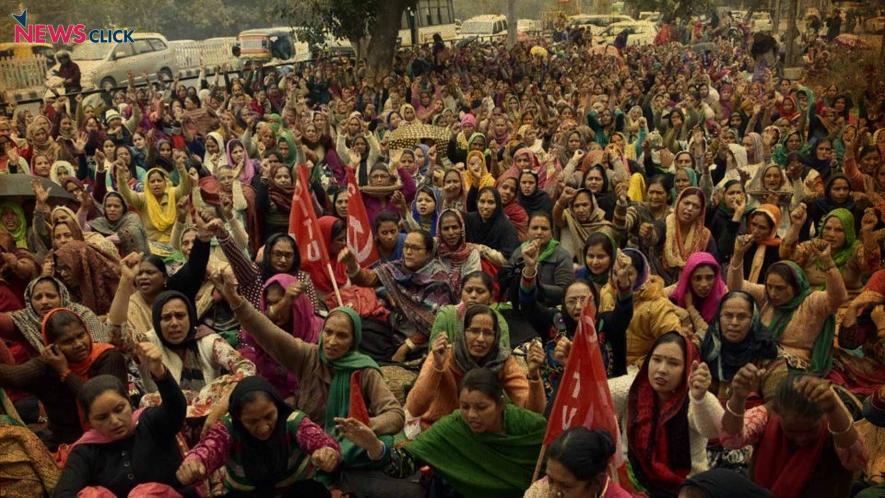Behind Scheme Workers’ Plight, ‘Undervaluation’ of Women’s Labour

When COVID-19 pandemic hit India, already beleaguered footsoldiers engaged under the government’s numerous schemes – ranging from ensuring health to rural households to providing meals to school children – were left stress-ridden and gutted.
Their hopes of getting recognised for their work, that had gone unacknowledged for years, remained in the making—despite being at the forefront in assisting the government in contact tracing the infected patients and distributing rations to the needy during the ongoing crisis.
In this backdrop, on August 8, the scheme workforce completed a two-day work strike, which, the union leaders said, they were ‘forced’ to in a bid to draw attention to their plight.
Those who participated included ASHAs – or, Accredited Social Health Activists – Anganwadi, Mid-day meal, and National Health Mission (NHM) workers.
Pratibha Sharma, an Anganwadi worker in Punjab’s Bathinda told NewsClick: “I would receive a paltry sum of Rs. 7,500 a month [as opposed to Rs. 3,750 that her helper would earn] for my work, with no incentives and no social benefits.” In March, however, Anganwadi centres were closed in the wake of the rising COVID-19 cases.
“But that didn’t mean no work for us,” Sharma said, who was now engaged in awareness campaigns and door-to-door surveys in her ward. “The work time has only doubled, but the monthly rates, delay in wages,” and with it the degree of exploitation, “remain as they were.”
Sharma is only one among the 14 lakh Anganwadi workers (and, 13 lakh helpers) across the country, carrying similar complaints.
Move to the South, the situation doesn’t look any better, wherein Karnataka, around 42,000 ASHAs had staged an indefinite strike – which ended only last week, after 20 days – pressing for a fixed monthly payment.
The ASHA workers, who play a crucial role in providing healthcare facilities to the rural community, were assured by the state BJP government that they will be provided with protective gear while engaging in contact tracing activities, said Hanumesh G of the Karnataka’s ASHA Workers’ Union backed by All India United Trade Union Centre (AIUTUC).
“Even that demand has remained unmet, with complaints still coming from many districts. The ASHAs are having to risk their lives, along with being at the receiving end of the harassment during the surveys,” he said.
Demonstrations were held at the district levels in Karnataka, Hanumesh informed NewsClick, to extend support to the 6 lakh ASHA workers, who, in other states, we're observing the two-day strike.
NewsClick spoke with NHM and midday meal workers from different parts of the country and discovered a common pattern of non-payment of their meagre wages and poor labour environment, which has only exasperated the scheme workforce in the wake of COVID-19 pandemic.
At the heart of this arrangement lies the insistence on envisaging the scheme workers as “honorary” ones, who are deprived of minimum wages and instead paid monthly honorariums.
Shalini Sinha, an activist based in New Delhi, believes this to be an “undervaluation” of the labour done by the women. “Resorting to semantics about ‘honorarium’, as opposed to ‘wages’, reflects the mindset of devaluing the care work that has traditionally been done by the women.”
ASHAs and Anganwadi workers are all women workforce, while nine out of 10 of every midday meal worker in the country reportedly belongs to the female gender.
“The ongoing health crisis has put the significance of the care work in the focus, making the need to acknowledge the work done by women,” Sinha said, who is also India Country Representative for the Women in Informal Employment: Globalising and Organising (WIEGO), a global research policy network focusing on women workers in the informal economy.
Referring to the showering of flower petals on the frontline workers, Sinha said, “[Such] actions lack meaning if not accompanied by minimum wages, and workers’ rights.”
Its fallout can be witnessed in the compromised health infrastructure in the country that is struggling to battle the spread of COVID-19, believes T. Sundararaman of Jan Swasthya Abhiyan (JSA), who is also a community medicine specialist.
“These frontline workers play a huge role in universalising health as an essential public service. Non-regular nature of their labour contract also reflects the neglect of the government towards the needs of the poor,” he said.
The ruling dispensation is rescinding its commitments by undermining the schemes that had been launched under the democratic pressures, Sundararaman added.
The two-day strike, called to challenge this attack by the government, received support from the beneficiaries as well, A R Sindhu of Centre of Indian Trade Unions (CITU) said. Demands including making the centrally sponsored schemes permanent, along with a minimum wage of Rs. 21,000 and Rs. 10,000 as pension to its workforce, were raised.
“The demands will not be met until a political pressure is made from all sections,” Sindhu told NewsClick. She is also the coordinator of the Joint Platform of Scheme Workers Federations and Unions, that had called the strike.
Following the strike action, on August 9, these workers will also be joining the jail bharo protest called by the 10 central trade unions.
Get the latest reports & analysis with people's perspective on Protests, movements & deep analytical videos, discussions of the current affairs in your Telegram app. Subscribe to NewsClick's Telegram channel & get Real-Time updates on stories, as they get published on our website.























